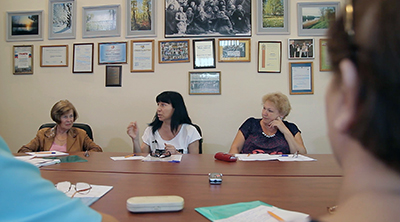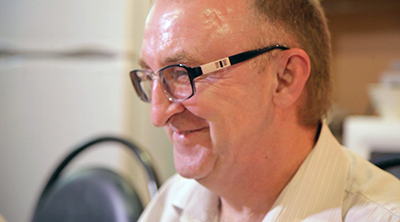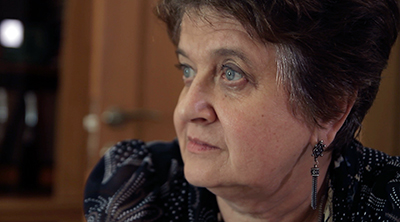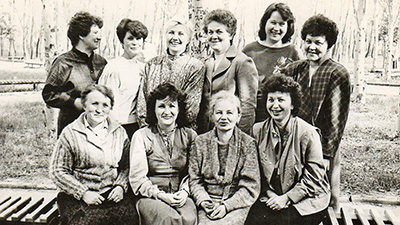Valentina Cherevatenko
NGO’s chairperson
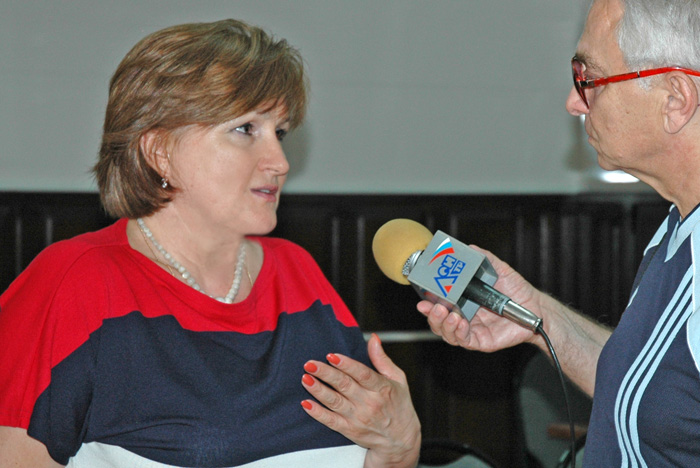
Valentina Cherevatenko
As long as I can remember myself, I have been an activist. There was no particular moment when I realized that I was going to be a human rights defender. I was a member of Komsomol and the Party Committee. I started working at a very young age. When I finished high school, I was accepted to the evening department of the Polytechnic University. First, I worked at the factory and joined the Komsomol Regional Committee at that time. Then I became the head of the finance and accounting sector of the Komsomol Regional Committee, and after some time I returned to the factory, while simultaneously completing my university studies. By then, I had already been bringing up two children.
We had plenty of problems at the factory. I was always among the activist bunch, and things developed as by the laws of physics: similarities repelled one another while dissimilarities were attracted. People of various generations worked in our party cell, but we still had a great team. For example, once we decided to build together a house for our factory department’s staff in a recreation camp. People invested their own personal time to make this happen. It seems like such stories can no longer happen in present-day society anymore.
«I was one of those few, who didn’t throw away their Communist Party membership card, although many people expected this from me due to my democratic views»
I realized that I was among real people, and such behavior would not have been proper. I tried to improve the party from within, but now I remember those days as if they were happening in a parallel universe.
My mother raised us alone, and for a long time I looked at the world through rose-colored glasses. When I was in the ninth grade, I was concerned about the fact that all the revolutions in the world had already happened, all the scientific gaps had been filled. I feared I would have nothing to do in this life. At the moment, I am remembering this with a smile.
When my first son died, my rose-colored glasses disappeared. We grew up in such conditions when we were constantly told that the Soviet Union was the best of the best and that everything in this country was done for the common good of all its citizens. When my son was one month old, we were sent to the hospital because he had been gaining weight very slowly. He would get sick very often, because it got frosty quite early that year, so we had to get back to the hospital time after time. My child died on December 31, 1974. We spent his last days in the hospital, and I have no idea how I managed to survive during that period. I remember myself standing next to him, holding the drip, while everyone was passing by not paying any attention. I suppose, that was the moment when a human rights defender started to awaken inside me. I was 20 years old. Since then I know for sure that I alone have to be the master of my fate.
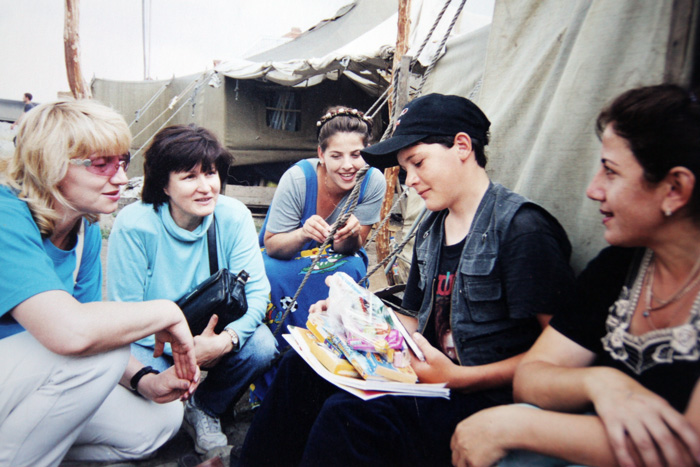
Valentina Cherevatenko
A women’s committee was created at the factory where I worked. In addition, we also founded a joint stock company “MIR” (short for Russian “Mother and Child”) with other women. At first, we didn’t think of registering a legal entity. We were just a group of women who were hard workers ready to solve problems and who were helping others a lot. We organized social programs and created a database of children under guardianship, multi-child families and single mothers. We knocked the doors, asked for assistance, and tried to help. A bit later, we came to a conclusion that people could ask for themselves. This is how MIR was created. In the 1990-s, I was a deputy and a chairperson in the Committee on Motherhood and Women Affairs. I took this duty because the women at the factory nominated me for this position. In those difficult times we distributed humanitarian supplies received from the dwellers of our sister city in Germany.
I remember that starting up the laundry alone took us several years. Then we launched a hairdressing salon, an outworking sewing workshop, and a shop. It was a social enterprise. We were providing free laundry services for senior citizens and introduced grace days. The sewing workshop and the shop were successful up until the moment when Chinese goods flooded the market. When MIR was closed, we handed over the hairdressing salon to its employees.
«In 1993, the factory committee in cooperation with women deputies brought together the first forum ‘Women of the Don’. This was the point of time when it was decided to launch the ‘Women of the Don’ Union»
We organized our activity in a way that would facilitate intercommunion with different people, groups and structures. Our fundamental idea was to gather various women regardless of their social status, political views and religious beliefs.
The core activities of “Women of the Don” include peacekeeping, human rights and social work on the ground. Peacekeeping is carried out with two main focuses: rehabilitation and the facilitation of dialogue. Human rights defense can be broken down into human rights protection, educational programs and search for new working forms and methods. Social work implies cooperation with deputies, schools, programs for youth, as well as projects on transparent budget. Peacekeeping activity is of utmost significance for me, because it is about preventive measures, which, in case of their success, result in less conflicts, destruction and murders. This work is insanely hard. One of my colleagues once said:
«Peacekeeping is like walking with cat’s paws on a razor blade. A fluffy cat’s paw covers the blade entirely, and no one notices how painful that is»
I recall people whom I met in conflict zones in the Caucasus region, and when I meet them today, I am so glad that they remember me as well. We always have something to talk about. The Ukrainian story is especially painful to me. We all are in a mirror-world now. We are hitting our own reflection.
In the very beginning of the Ukrainian conflict we conducted focus-groups in both countries. We did not have any funding for this work, therefore everything was done online. We decided that we would not remain indifferent and silent towards the expanding military conflict. We were determined to do everything possible to restore good-neighborliness and normal human interaction.
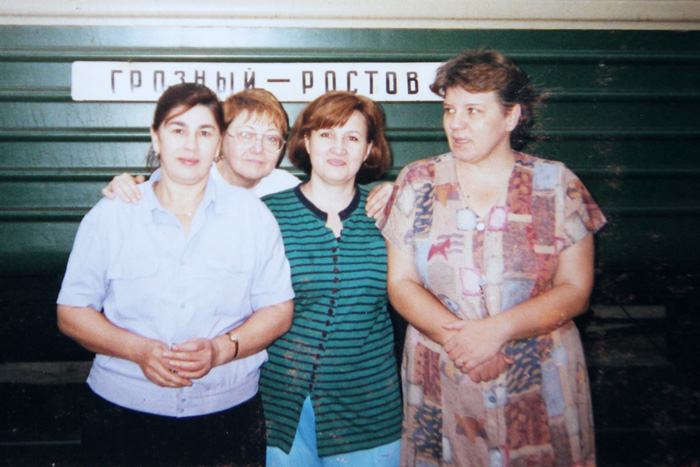
Это пример подписи, которая появится, когда будут материалы.
We prepared an appeal and posted it online. We did not have enough resources to work with warmongers and those who saw no possibility for cooperation, that is why we were searching for the like-minded people. We had information that human rights defenders and psychologists were holding meetings somewhere at their own expense; we knew that different dialogues were going on. We wrote to some of those people and soon started getting their replies.
Most of the Ukrainians told us that they were ready to have dialogue, but they expressed doubts regarding the Russian side’s willingness to engage in it. For several months I was communicating with dozens of people from both countries by skype. My colleagues from Switzerland had a project in Ukraine, and I asked them to take me there with them. We got some amazing data from the focus-groups that we had conducted. I spent a lot of time studying those data and absorbed them emotionally. The analysis demonstrated that only one fourth of all the participants from both sides was ready for dialogue.
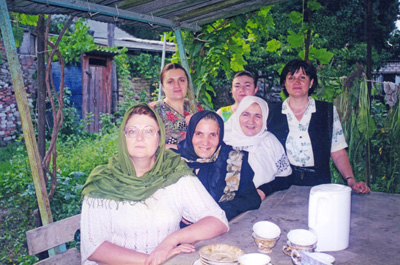
Это пример подписи, которая появится, когда будут материалы.
When the Presidential Council on the Development of Civil Society and Human Rights came to Novocherkassk, our office was attacked by the Cossacks and NOD activists (National Liberation Movement). The fact that these people under certain conditions can appear here is an alarming signal for me. They were standing near our office and shouting that this was the place where “enemies of the Russian nation and betrayers” worked. They blocked the entrance to the building shouting and holding a sign, which read “betrayers – this way”. All this happened despite the fact that we had successfully cooperated with the local Cossacks on many issues. We did not have any problems when it came to basic values. We had a dialogue, argued sometimes, they quite often came to our seminars, but it never ended with insults.
I cannot discern any political rationality, when at first they say that an organization should register as a “foreign agent” only when it receives money from abroad and is engaged in politics, and then they set up everything in such a way that virtually any activity can be interpreted along those lines. One of my friends once said:
«Do you really think that if you are helping organize solid waste collection and disposal in the city center you are doing something good? No! You are showing our weak spots to our enemies»
When the legislation about “foreign agents” was considered and then eventually passed, we were participating in the contest launched by the European Union. Despite very tough competition, we managed to win in that contest. I was absolutely sure that our project on the development of theater, dialogue between generations, and search for a new language of intergenerational communication cannot harm anyone. I did not believe that this project could be interpreted as political activity, but someone was constantly hustling about. I am not afraid of the new reporting system that becomes obligatory, once an organization is put on the “agents” list. We are planning to work as usually, and we will become even more transparent – this is not a problem.
Even before they put us on the list, we were getting phone calls with the voice on the other end of the line saying “Your hands are steeped in blood up to your elbows. Your bosses are killing Russians.” Some representatives of the public prosecutor’s office tried to persuade us to get on the list of “foreign agents.” But what does this mean? In the consciousness of the Russian people an agent is equal to a spy. And I do very much care what people living around me think.
«I’m not going anywhere from here. This place is my home; this is my city and my country. People, whom I respect and who respect me, live here. I am not going to stigmatize myself with the label of ‘foreign agent’ without any reason»
This symbolic separation is needed to make it so that other people would start spitting in one’s face. And the first people who started doing this with us were the people in the position of power. “Women of the Don” always cooperated with the officials. In our project “Transparent Budget” we were explaining the deputies how the budget works, how to read and understand it. Within the framework of this project we also held special business games and trainings. One of the participants, who is an official and who was earlier thanking us for the opportunity to participate, is now sending the Cossacks to antagonize us. Human beings are weak, while a life in the position of power is too precious.
Once I came to our office and found out that someone had broken the windows. It was freezing cold outside, around -30 °C. Some local entrepreneurs saw that our windows were broken and arranged a replacement. By noon of the same day everything was fixed. I did not even have a chance to call anyone, people just saw the problem and helped us fix it. It is a shame that I cannot openly express my gratitude to those who help us, because I might set them up.
We are planning to continue active work, despite the criminal case and all those never-ending trials, in which we are trying to vindicate our freedoms and rights. Many of my colleagues have left the organization and found another place of work. We are usually refused financial aid in the Russian contests. We cannot rely on foreign money, because this would mean that we have to get back to the “foreign agent” status. All of us have families, so now we are doing this in our spare time. Once we all started from this point, if you remember the story about the factory, so we have no fear.
